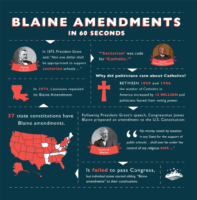
How the Blaine Amendment Discriminates Against Religious Organizations
James Gillespie Blaine proposed amendment to the United States Constitution that would, prevent any government aid to “sectarian schools,” especially Catholic schools. Learn what Justice Clarence Thomas said about the amendment at Firstliberty.org/Briefing.
Thank you for joining us for the First Liberty Briefing, an exclusive podcast where host Jeremy Dys—also First Liberty Senior Counsel—provides an insider’s look at the stories, cases, people and laws that have made America the world’s leader in protecting religious liberty.
James Gillespie Blaine had an interesting life. He served as Speaker of the House of Congress and in the United States Senate. Twice he served as Secretary of State, holding the position under three separate presidents. He even sought the presidency, losing to Grover Cleveland.
Blaine’s most notorious legacy, however, is an amendment that bears his name.
 Blaine got his idea from a fiery speech delivered by President Grant at the height of a national controversy over the nation’s public schools, and whether religion had any place within them. In 1875, President Grant declared, “Leave the matter of religion to the family altar, the Church, and the private school, supported entirely by private contributions. Keep the Church and State forever separate.”
Blaine got his idea from a fiery speech delivered by President Grant at the height of a national controversy over the nation’s public schools, and whether religion had any place within them. In 1875, President Grant declared, “Leave the matter of religion to the family altar, the Church, and the private school, supported entirely by private contributions. Keep the Church and State forever separate.”
Days later, Blaine introduced a proposed amendment to the United States Constitution that would, prevent any government aid to “sectarian schools,” especially Catholic schools.
His amendment failed, but various states borrowed his proposal and their constitutions were amended instead. Today, almost 40 states have a constitutional provision that prevents government aid to religious institutions. (Arkansas, Connecticut, Maine, Maryland, New Jersey, North Carolina, Rhode Island, Tennessee, Vermont, West Virginia, Louisiana. South Carolina and Utah being the exceptions.)
These amendments have empowered states to legally discriminate against religious organizations when they perform the same work secular institutions do.
That prejudice led Justice Thomas to write of Blaine Amendments in the 1999 decision of Mitchell v. Helms, “This doctrine, born of bigotry, should be buried now.”
To learn how First Liberty is protecting Religious Liberty for all Americans, visit FirstLiberty.org.
First Liberty Institute is the largest organization in the nation dedicated exclusively to protecting religious freedom for all Americans. Find out more here.
(This podcast is by First Liberty Briefing. Discovered by Christian Podcast Central and our community — copyright is owned by the publisher, not Christian Podcast Central, and audio is streamed directly from their servers.)